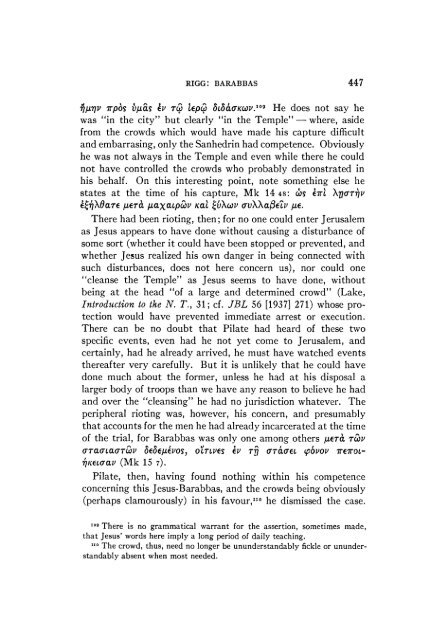Horace Abram Rigg, Jr. Source: Journal of Biblical ... - YoYo.pl
Horace Abram Rigg, Jr. Source: Journal of Biblical ... - YoYo.pl
Horace Abram Rigg, Jr. Source: Journal of Biblical ... - YoYo.pl
Create successful ePaper yourself
Turn your PDF publications into a flip-book with our unique Google optimized e-Paper software.
RIGG: BARABBAS<br />
447<br />
ft]jE,v 7rpos v/uas Ev rT lepcJ tt&OKCc.V.109 He does not say he<br />
was "in the city" but clearly "in the Tem<strong>pl</strong>e" - where, aside<br />
from the crowds which would have made his capture difficult<br />
and embarrasing, only the Sanhedrin had competence. Obviously<br />
he was not always in the Tem<strong>pl</strong>e and even while there he could<br />
not have controlled the crowds who probably demonstrated in<br />
his behalf. On this interesting point, note something else he<br />
states at the time <strong>of</strong> his capture, Mk 14 48: COs Erl XnTTr)v<br />
Er77XOarE T E,ra LaXaLpWv Kal vXcov ovXXaJSELv !/E.<br />
There had been rioting, then; for no one could enter Jerusalem<br />
as Jesus appears to have done without causing a disturbance <strong>of</strong><br />
some sort (whether it could have been stopped or prevented, and<br />
whether Jesus realized his own danger in being connected with<br />
such disturbances, does not here concern us), nor could one<br />
"cleanse the Tem<strong>pl</strong>e" as Jesus seems to have done, without<br />
being at the head "<strong>of</strong> a large and determined crowd" (Lake,<br />
Introduction to the N. T., 31; cf. JBL 56 [1937] 271) whose protection<br />
would have prevented immediate arrest or execution.<br />
There can be no doubt that Pilate had heard <strong>of</strong> these two<br />
specific events, even had he not yet come to Jerusalem, and<br />
certainly, had he already arrived, he must have watched events<br />
thereafter very carefully. But it is unlikely that he could have<br />
done much about the former, unless he had at his disposal a<br />
larger body <strong>of</strong> troops than we have any reason to believe he had<br />
and over the "cleansing" he had no jurisdiction whatever. The<br />
peripheral rioting was, however, his concern, and presumably<br />
that accounts for the men he had already incarcerated at the time<br />
<strong>of</strong> the trial, for Barabbas was only one among others EETaE rwT<br />
oTaoLaoaTWv 6EcEcevOS, O'TLVES Ev rTr OrTaeL (p6vov TreroL-<br />
?7KEcrLav (Mk 15 7).<br />
Pilate, then, having found nothing within his competence<br />
concerning this Jesus-Barabbas, and the crowds being obviously<br />
(perhaps clamourously) in his favour,IIo he dismissed the case.<br />
o09<br />
There is no grammatical warrant for the assertion, sometimes made,<br />
that Jesus' words here im<strong>pl</strong>y a long period <strong>of</strong> daily teaching.<br />
"o The crowd, thus, need no longer be ununderstandably fickle or ununder-<br />
standably absent when most needed.


